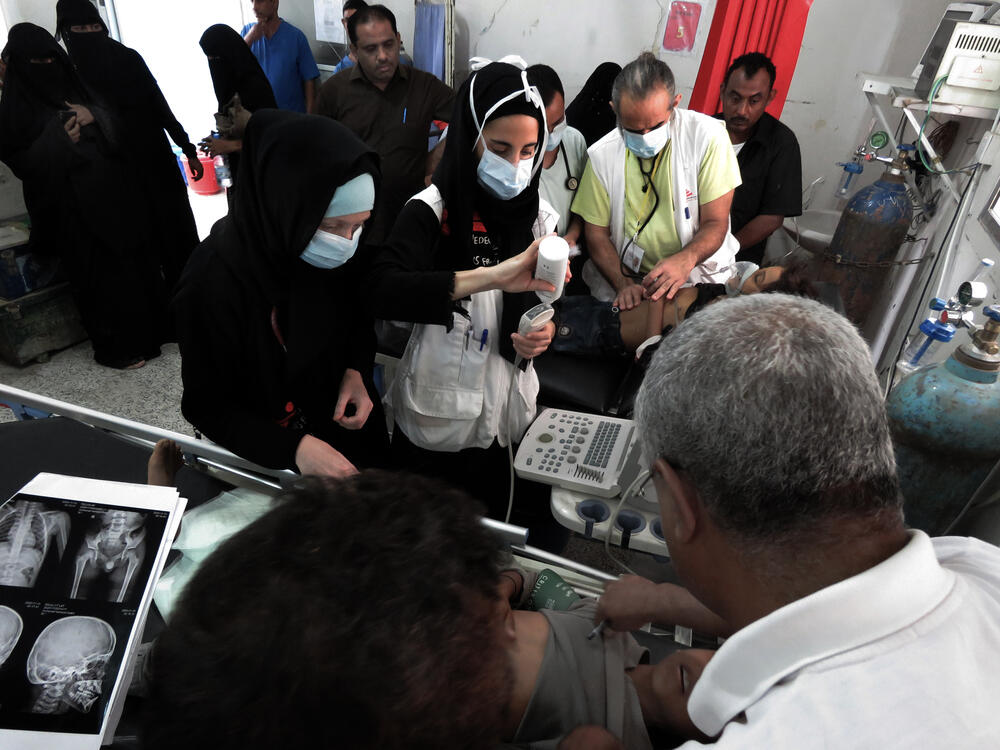Yemen: Severe malnutrition rising among children in Abs
Since the beginning of the year, MSF has been treating increasing numbers of severely malnourished patients at Abs Hospital, in the Hajjah governorate of northwest Yemen.
While there are always annual peaks in malnutrition, cases in Abs are up 41 percent compared to the same period last year.
Severe malnutrition is associated with a host of other health problems that can be fatal for young children and babies if left untreated.
“The war has decimated the economy here, destroying livelihoods so that people can no longer afford food to feed their families or fuel to travel to seek work or medical care”
Six years of war
One young patient treated by the Médecins Sans Frontières / Doctors Without Borders (MSF) team at Abs Hospital is Hamdi.
He is not yet two years old, but this is already his second time at the hospital in the north of the country. The first time he was five months old.
Now, just over a year later, he is suffering from severe malnutrition with pneumonia. His eyelids are swollen, he has a constant cough and he has a hard time breathing.
His family has lived in a country at war for the past six years. War is all he has known for his entire life.
Hamdi is one of more than a hundred children that MSF has treated at the Abs Inpatient Therapeutic Feeding Centre since the beginning of the year.
Most of them are under five years old and all are suffering from severe malnutrition.

Help us prepare for the next emergency
Rising rates in Abs
“There are many reasons why we are seeing malnourished children in Abs, but most of them are connected to the brutal, six-year long conflict that has plagued Yemen since 2015,” says Muriel Boursier, MSF country manager for Yemen.
“The war has decimated the economy here, destroying livelihoods so that people can no longer afford food to feed their families or fuel to travel to seek work or medical care.
“Many public sector staff – including medical workers – haven’t been paid in years. Prices are constantly rising: without humanitarian aid, many families would not eat at all.”
232,800
PEOPLE ADMITTED TO HOSPITAL BY MSF IN YEMEN IN 2024
65,600
PEOPLE TREATED FOR CHOLERA BY MSF IN YEMEN IN 2024
38,700
BIRTHS ASSISTED IN BY MSF IN YEMEN IN 2024
“The vast majority of the population in Abs relies on humanitarian aid for survival,” adds Boursier.
“But, in spite of this clear need, it is a constant challenge for humanitarian organisations to reach the most vulnerable populations. The humanitarian response lacks continuity, is insufficient, and underfunded”.
MSF calls on parties to the conflict, and the humanitarian community of donors and organisations to ensure that families can access food and essential services, and that humanitarian assistance reaches those in acute need.
MSF in Yemen
Yemen is in the midst of a civil war. Since March 2015, a Saudi and Emirati-led coalition has been fighting anti-government Ansar Allah forces, resulting in widespread destruction, bombing and gun battles.
Recent outbreaks of diseases and an upsurge in fighting have exacerbated the already dire humanitarian situation in Yemen. With an estimated 20 million in need of humanitarian assistance, our activities in Yemen are among our most extensive worldwide.
Médecins Sans Frontières / Doctors Without Borders (MSF) works in 12 hospitals and health centres across the country and provide support to more than 20 hospitals or health facilities across 11 governorates.
